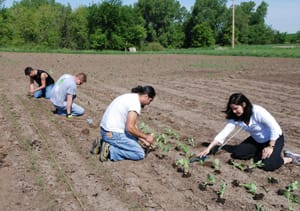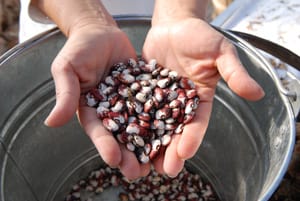By Melody Morrell
It is likely you have heard of Community Supported Agriculture (CSA), but how about Tribally Supported Agriculture (TSA)? The Shakopee Mdewakanton Sioux Community (SMSC) in Minnesota started planting their Wozupi (“garden” in Dakotah) in 2010, providing certified organic, locally grown whole foods to the surrounding community using fair labor practices and environmentally sustainable methods.
 |
under organic cultivation. |
Today, there are 12 acres under cultivation, providing heirloom and tribally significant crops including vegetables, herbs, and fruit through their TSA, farmers market, and natural food market, Mazopiya. Bees, goats, and chickens thrive, and maple sap becomes syrup.
“Wozupi is seen as a community service,” says Director Rebecca Yoshino. The gardens provide produce at deep discounts to the tribe’s casino restaurants and all community-operated departments (Educare, Education, Health and Wellness, and Mazopiya). They donate TSA shares to Scott County Native American families identified by SMSC’s Family and Children Services department, and make weekly donations to the local food shelf. A prescription fruit and vegetable program is also being discussed.
Every aspect of Wozupi feeds the community. Angora goats are bred for their fiber, which will be used in fiber arts classes, and the animals’ personable demeanor enhances the experience children and adults have when they visit the farm. Wozupi hopes to work with the SMSC behavioral health department to incorporate animal therapy work with their clients. Wozupi offers affordable community education classes on many topics, including animal husbandry, maple syruping, food preservation, and seed saving. Each spring their plant sale distributes thousands of organic vegetable, fruit, and herb seedlings into the gardens of community members.
Wozupi has had a major impact on the many children who help tend the garden from seed to plate. Children return every year—some have attended for five years—and enjoy eating whatever they grow. Wozupi has also worked with area schools, helping to establish small fruit orchards and to tap sugar maple trees in the spring.
Yoshino notes, “We are trying to establish a healthy foundation for these children with a tangible relationship to where their food comes from.” Yoshino grew up on a biodynamic organic farm in Upstate New York, attended a Waldorf high school, interned on a biodynamic farm, and has worked in the field for much of her life.
Sean Sherman, “The Sioux Chef,” is also working with Wozupi to get the produce he needs to create his signature Lakota and Ojibway cuisine. His catering company and soon-to-be-open restaurant in Minneapolis focus on introducing historic foods into the modern diet. The “indigenized diet” is the original local and seasonal way to eat.
 |
Keepers Alliance. |
Wozupi is dedicated to cultivating indigenous seeds and foods, working with the Minnesota Science Museum and Dream of Wild Health and their seed collections for training, data collection, and seed distribution. They have formed the Indigenous Seed Keepers Alliance (ISKA), working locally within the indigenous community on seeds, gardening, food, nutritional analysis, and seed-keeping trainings. ISKA is building a network of skilled individuals helping to preserve indigenous seed collections and bring them from seed to table.
ISKA’s seeds are not for sale yet, but have been given to Native organizations and distributed through seed swaps or giveaways at conferences and trainings. The seed packets read: “Opening this seed packet is an agreement that these seeds and any plants they produce will not be used for commercial breeding purposes with any patent outcome, nor will these seeds be manipulated to create and/or promote the production of genetically modified organisms.”
White Earth Land Recovery Project was recently awarded a three-year grant, funding the newly established Upper Midwest Indigenous Seed Keepers Network. Thirteen Native communities, including SMSC, have come together in the Network to develop inter-tribal seed saving, data collection, and distribution capacities. In a time when GMO seed and corporate agriculture threaten food sovereignty, this important work ensures that indigenous seeds and foods are preserved for the future.
For more information, contact Wozupi Tribal Gardens in Prior Lake, Minnesota, www.smscwozupi.org, (952) 496-2267.
Photos courtesy of Wozupi Tribal Gardens.

